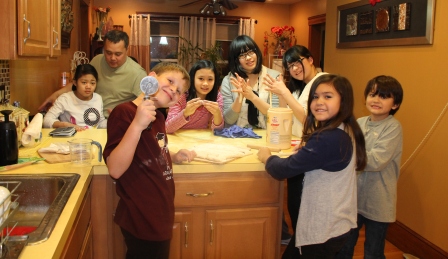Now that it’s January, many international students are coming to study in Boston! Whether they are returning after the winter holidays or arriving for the first time, it is not uncommon for seasonal blues, homesickness and culture shock to set in. Why is this? More importantly, what can be done to overcome it?
English fluency appears to strongly affect homesickness. As the stress of learning English is an ever-present challenge for many international students, these students often find themselves longing for the ease of speaking and learning in their native tongue. This pressure in social and academic situations to speak English can be the reason alone why a visitor seems a bit down.
Academic performance is another stressor that affects culture shock in international students. The role of classroom participation in American culture may be new to international students, many of whom are used to just passively listening to the lessons. Differences in essay-writing styles, exams and coursework level of difficulty are other factors relating to this. Students who are struggling in certain courses, or those overwhelmed by the start of a new semester, may experience bouts of culture shock this time of year.
If a student has returned to his or her native country over the winter holidays and is now back in Boston, another wave of culture shock may roll in. At this point, the differences between the two cultures will be more pronounced and fresh in the student’s mind. After returning to that sense of familiarity and comfort back in the home country, the student may not be ready or excited to be back in the United States.
International students may be a bit down this time of year simply because it is winter. Days are short and dark, it’s cold outside, and it is a common time of year to get sick. For visitors from countries near the Equator, they may find the cold winters in the Northeastern United States to be a bit of a shock. Likewise, visitors whose native countries are in the Southern Hemisphere may be sad to be missing summer weather and time off from school back home.
Much of culture shock and seasonal depression stems from the visitor’s individual personality. If your visitor is naturally quiet and spends most time studying or in a private bedroom, take each opportunity to make the visitor feel included in your family’s events. This could be as simple as helping to prepare dinner or watching a movie/television together.
While culture shock may not be the most fun experience for the visitor, this time period is a crucial opportunity to bond and develop strong relationships with the host family. One of the best benefits of living with a host family is the knowledge that family can provide. For instance, international visitors expect locals to have information on how to get places, recommended sites to visit, and other quirks of the culture. The student also sees the family as a great resource to help them practice their English and help with their studies. The more you can interact with your visitor in these ways, the better.

Here are suggestions for a homestay visitor to deal with culture shock. Keep a journal. Not only is writing a release of emotions, but having a personal record of reactions to an intercultural experience will soon become invaluable to the visitor once the experience is over. Teach the host family about their home culture. This can be done through dinnertime conversations or showing them a personal item, sharing images, holiday celebrations or a favorite food dish from home. That way, the visitor can stay connected to the home country while the host family learns something new. A win-win as we say!
Culture shock during a visitor’s stay is cyclical. The initial reaction to a new culture is always the biggest shock, but it is not uncommon for culture shock to reappear in smaller doses throughout the visit. Unless the visitor has just arrived, chances are that the shiny newness of attending school in the United State has worn off by now and that the visitor is realizing American life for what it really is. You do not need to be an international visitor to know that winter here can often bring on seasonal blues and sadness. Therefore, since we’re all stuck inside on these cold days, take the opportunity to speak with your visitor about culture shock. Contact us if you have other suggestions or ways to overcome culture shock or how you as a homestay visitor have managed culture shock!
Sources: Compelling Counseling, The Psychology of Culture Shock, The International Student Blog
